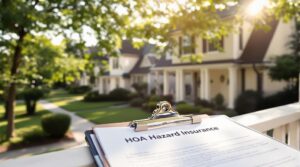HOA legal responsibilities encompass fiduciary duties, financial management, and compliance with governing documents. Board members must exercise reasonable judgment in decision-making while maintaining detailed records of all transactions and communications. Property owners are subject to assessment guidelines, conflict resolution protocols, and documentation requirements established by state regulations and bylaws. Understanding these obligations, along with the role of public adjusters in property claims, enables effective participation in HOA governance.
Key Takeaways
- HOA board members must maintain detailed financial records and provide transparent access to association documents for all homeowners.
- All homeowners must pay assessments fairly and equally as determined by the board's annual budget and governing documents.
- Boards must follow established conflict resolution protocols and maintain impartial decision-making processes when addressing homeowner disputes.
- HOAs must retain critical records, including meeting minutes and financial transactions, for at least 7 years.
- Board members have fiduciary duties to act in the community's best interest and exercise reasonable judgment in decision-making.
Understanding HOA Board Members' Core Duties
Board members of Homeowners Associations shoulder significant legal responsibilities that stem from their fiduciary duties. These duties encompass three fundamental obligations: the duty of care, duty of loyalty, and duty to act within scope of authority. Each component reinforces board accountability and establishes the framework for ethical governance within the community.
Board members must exercise reasonable judgment in financial management, including budget creation and assessment collection. This responsibility requires meticulous documentation and fair treatment of all homeowners.
To protect against personal liability, members should secure indemnification provisions and Directors & Officers insurance coverage.
The Business Judgment Rule serves as a legal standard for evaluating board decisions, requiring members to demonstrate rational decision-making processes.
Extensive record-keeping of board actions, financial transactions, and enforcement measures provides essential protection during potential legal challenges and guarantees transparency in community management.
Financial Obligations and Assessment Guidelines

While maintaining financial stability forms the cornerstone of HOA operations, proper management of assessments and financial obligations requires strict adherence to established guidelines and protocols.
Homeowners associations must demonstrate financial transparency through thorough annual budgets and regular reporting that reflect both historical expenditures and projected costs. Assessment fairness remains paramount, requiring equal treatment of all property owners regardless of individual circumstances.
- Detailed documentation of all financial transactions and assessment collections must be maintained to protect against legal vulnerabilities.
- Regular financial reporting and disclosure requirements promote accountability to association members.
- Non-compliance with financial obligations can result in significant legal consequences, including foreclosure actions.
The board's responsibility extends beyond basic bookkeeping to include strategic financial planning and strict enforcement of payment obligations.
These measures safeguard the association's ability to maintain community standards while protecting against potential legal challenges that could arise from inconsistent financial practices or inadequate documentation.
Legal Rights and Protections for Board Members

Serving on a homeowners association board carries significant responsibilities, but various legal protections shield directors from personal liability when performing their duties in good faith.
The Business Judgment Rule serves as a fundamental board member protection, safeguarding decisions made within the scope of their authority.
State laws frequently provide additional liability protection for HOA board members, while indemnification clauses in governing documents can cover legal expenses incurred during official duties.
Directors & Officers (D&O) liability insurance offers another vital layer of protection against potential lawsuits related to governance activities. This insurance specifically addresses claims arising from board decisions and actions.
To maintain these protections, board members must document their decision-making processes thoroughly.
Detailed meeting minutes, financial records, and written correspondence serve as essential evidence demonstrating that actions were taken in good faith and within authorized parameters, helping defend against potential legal challenges.
Navigating Conflicts and Decision-Making Standards

Effective management of HOA conflicts demands a structured approach grounded in established decision-making standards. Board members must implement clear conflict resolution protocols while adhering to the business judgment rule, which serves as a fundamental framework for evaluating board decisions. Documentation of decision-making strategies and compliance with governing documents strengthens the board's position during disputes.
- Board members must maintain detailed records demonstrating their adherence to bylaws and state regulations when making decisions.
- Conflict resolution procedures should prioritize transparent communication and objective evaluation of community interests.
- Implementation of systematic decision-making strategies helps guarantee board actions meet the duty of loyalty requirements.
When conflicts arise, board members must balance their fiduciary responsibilities with practical solutions that serve the community's best interests. This requires thorough understanding of relevant legal frameworks, careful consideration of available options, and consistent application of established procedures.
Proper documentation and adherence to governing documents provide essential protection for both the board and the association during dispute resolution processes.
Record-Keeping Requirements and Documentation Practices

Proper record-keeping forms the cornerstone of HOA governance and legal compliance. HOA boards must maintain thorough documentation practices that encompass meeting minutes, financial transactions, and communications with homeowners. These records serve as essential evidence of board decisions, rule enforcement, and fiscal responsibility.
Key Documentation Requirements:
| Category | Required Records | Retention Period |
|---|---|---|
| Meetings | Minutes, Votes, Resolutions | 7+ years |
| Financial | Budgets, Assessments, Expenses | 7+ years |
| Property | Maintenance Logs, Repairs | Duration of ownership |
Record retention policies must align with state regulations and governing documents. HOAs should implement systematic documentation procedures for maintaining accurate records of all board activities, financial transactions, and property management decisions. This documentation protects the association during audits, demonstrates compliance with fiduciary duties, and provides evidence in potential legal disputes. Digital storage systems, when properly secured, can enhance accessibility while ensuring long-term preservation of critical records.
The Benefits Of Consulting A Public Adjuster

Public adjusters offer essential expertise in managing complex insurance claims while providing objective assessments of property damage within HOA communities.
Their professional involvement streamlines the claims process through meticulous documentation and skilled negotiation with insurance carriers.
Studies indicate that employing a public adjuster typically results in considerably higher claim settlements, with payouts potentially increasing up to 800% compared to claims handled without professional representation.
Expertise In Insurance Claims
Steering insurance claims within an HOA environment can be greatly enhanced by consulting a public adjuster, whose specialized expertise often leads to more favorable settlement outcomes.
These professionals possess deep knowledge of insurance policy nuances and employ effective claim negotiation strategies to maximize settlements. Their thorough understanding of policy language and documentation requirements guarantees complete claim submissions that address all potential damages.
- Public adjusters serve as dedicated advocates, managing all insurance company communications and documentation processes while protecting homeowner interests.
- Their expertise in damage assessment and valuation helps identify overlooked damages and guarantees accurate claim documentation.
- Operating on a contingency fee basis, public adjusters align their services with successful outcomes, typically securing larger settlements than homeowners could achieve independently.
Objective Damage Assessment
When evaluating property damage within HOA communities, engaging a public adjuster introduces an essential layer of objectivity and professional expertise to the claims process.
These licensed professionals conduct thorough objective assessments, identifying both apparent and concealed damages that might otherwise go unnoticed.
Statistical evidence demonstrates that property owners who utilize public adjusters receive settlements approximately 30% higher than those handling claims independently.
While these professionals typically charge 10-20% of the final settlement, their damage evaluation expertise often justifies this investment through increased compensation.
Their extensive understanding of insurance policies enables them to document and substantiate claims more effectively, ensuring all legitimate damages are properly accounted for.
This systematic approach to damage assessment proves particularly valuable in complex cases where multiple property elements require evaluation.
Streamlined Claim Process
Engaging a public adjuster greatly streamlines the insurance claims process for HOA property owners through professional advocacy and expertise.
These professionals enhance claim efficiency by leveraging their insurance expertise to navigate complex policy terms and procedures. Studies indicate that settlements managed by public adjusters typically result in 30% higher compensation compared to self-managed claims.
- Public adjusters work on contingency fees, aligning their interests with maximizing claim settlements for property owners.
- Their thorough documentation and evaluation methods guarantee accurate damage assessment and substantiation.
- Professional claim management allows homeowners to focus on recovery while experts handle negotiations.
The involvement of public adjusters not only expedites the claims process but also provides HOA property owners with professional representation that optimizes settlement outcomes through systematic documentation and skilled negotiation tactics.
Higher Claim Payouts & Settlements
Research demonstrates that public adjusters consistently secure higher insurance claim settlements for HOA property owners compared to self-managed claims.
Statistical data indicates that professional representation typically results in settlements 20% to 50% above initial insurance company offers.
Public adjusters enhance claim outcomes through extensive damage assessment protocols, identifying both visible and concealed property issues that might otherwise go unnoticed.
Their expertise in claim negotiation and thorough understanding of insurance policies guarantees all legitimate damages are properly documented and valued.
Operating on a contingency fee basis, these professionals align their interests with homeowners' financial outcomes.
Their specialized knowledge expedites the settlement process while maximizing compensation, making their services particularly valuable for complex HOA property claims requiring detailed evaluation and skilled negotiation.
About The Public Claims Adjusters Network (PCAN)

The Public Claims Adjusters Network (PCAN) operates as a nationwide alliance of state-licensed public adjusters who have undergone extensive vetting and verification processes.
These professionals specialize in handling both residential and commercial property damage insurance claims across more than 30 claim categories in over 40 states.
PCAN maintains rigorous adjuster qualifications through mandatory annual audits of licenses and complaint records.
- Pre-vetted members must complete an intensive application and interview process to demonstrate expertise and professional standards.
- Network coverage spans 40+ states with specialists handling 30+ types of property damage claims.
- Annual audits guarantee continued compliance with ethical standards and licensing requirements.
PCAN serves as a critical resource connecting policyholders with top-tier public claims professionals.
The network's strict admission criteria and ongoing oversight guarantee member adjusters maintain the highest standards of ethics, morality, and professional conduct while serving their clients' insurance claim needs.








